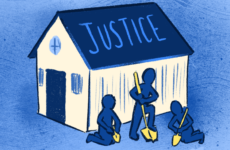
Graphic by Evelyn Kim ’25/The Choate News
By Alisha Gashu ’27 and CJ Lord ’27 Opinions Writers
At Choate, there is ongoing debate surrounding trash talk and abrasive language in sports. Many consider trash-talking a key component of friendly competition, seeing it as a factor to boost energy, intimidate opponents, and “hype up” teammates. However, the use of trash talk and abrasive language may also have negative effects on athletes by creating anxiety and pressure, therefore interfering with their focus and confidence during a game. Choate’s regulation of these behaviors serves the goal of creating a civil and inclusive environment that aligns with the School’s values of integrity, compassion, and respect. As such, limiting trash talk is beneficial in creating a healthy and encouraging environment for athletes.
While the Choate Student Handbook does not explicitly provide written rules regarding trash talk, Director of Athletics Mr. Thomas White emphasized the School’s focus on cheering for our teammates instead of bringing down our opponents. “We don’t need to tear other people down to lift up our people,” he said. Instead of undermining our opponents, healthy and respectful empowerment of Choate’s athletes plays a crucial role in achieving the goals of athletic competition. “Cheering for players when they make a great play, whether that’s a goal or faking someone out. These are the ‘oohs’ or the ‘ahhs’ that can be the good,” he added.
Additionally, restricting trash talk is imperative to help athletes foster a sense of respect, sportsmanship, and kindness in their sport. These values create an environment of inclusivity for less experienced athletes who may not be compatible with the high pressure of interscholastic sports. Those on Junior Varsity teams or new players to a sport may find intense competition to be overwhelming, and aggressive trash talk could further undermine their confidence.
Limiting trash talk also helps Choate athletes focus on their own athletic performance and collaboration with their teammates, rather than the other team. In the absence of this abrasive language, athletes are not burdened with what other people are saying about them. Trash-talking can lead to harsh self-criticism and self-doubt: thoughts that can damage one’s play.
We must recognize the significant distinction between speech that empowers Choate athletes and speech that solely insults the other team. For many athletes, empowering and respectful trash-talking is a way to get into the competitive spirit. Some athletes elevate their performance in the presence of trash talk.
While there is a space for trash talk in professional sports, limiting trash talk is ideal for Choate’s athletic environment. This way, we are able to form a respectful space for athletes that balances competitiveness and sportsmanship, limits self-doubt and insecurity, and fosters a focused and positive environment.




